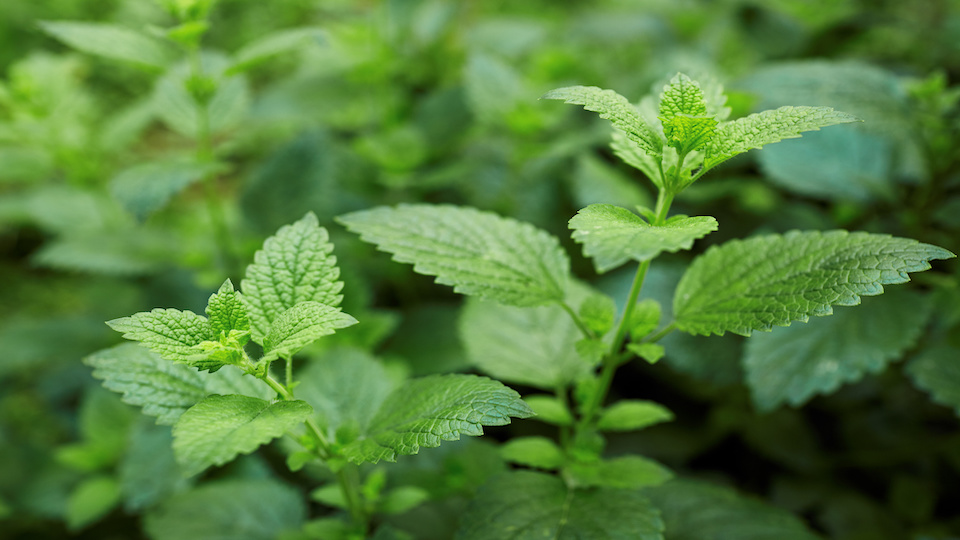Lemon balm is often grown in gardens to fight the mosquito menace. The active mosquito-repellant component is citronellal, which gives the herb its pleasant lemony smell. Fortunately, that smell is repulsive to insects.
When lemon balm is crushed and rubbed on all exposed body parts, it is just as effective as the common chemical mosquito repellents that contain DEET, but without the risks associated with this compound.
Although the bug-repellant effect of the herb is not as long-lasting as that of DEET, it shouldn’t be an issue if you have the plant growing in your garden. Just pick some more leaves and reapply when you sense the protective shield wearing off. It’s not only free but safer too.
Should you grow lemon balm even if you’re not bothered by mosquitoes?
The uses of Lemon balm or Melissa officinalis do not end with its mosquito repellent action. The very name of the herb speaks of its medicinal properties. When plants were first classified and given scientific names, those with known medicinal use got the specific epithet ‘officinalis.’
In its native Mediterranean and West Asian regions, lemon balm has been used medicinally for ages to cure many infections and diseases. Recent research into the various healing properties of lemon balm seems to support these claims. That should give you plenty of reasons to grow this multifaceted herb in your garden.
Lemon balm reduces stress and anxiety
The popularity of lemon balm spread across the world, mainly because of its calming effect on the mind and body.
A relaxing tea or tisane can be made by steeping a handful of fresh lemon balm or a teaspoon of dried leaves in a cup of boiling water for 10 minutes. Even smelling crushed leaves or rubbing it on hands may have a similar effect.
Increases alertness
It may seem counterintuitive that an herb that’s used as a relaxant could also make you alert. Rub a few leaves between your palms and take a sniff. All your doubts will disappear as the refreshing citrusy aroma instantly perks you up.
The herb contains a complex set of compounds, each having different effects on our nervous system. While it reduces the impact of stress, it also removes mental fog and improves focus and concentration.
Improves cognitive function and memory
Lemon balm has been traditionally used for this purpose, and several clinical studies now prove it. In a study conducted on young adults, those who took dried leaves in capsule form got higher scores in computer-based memory tests. It is also found to be effective in reducing symptoms of Alzheimer’s in older people.
Promotes restful sleep
Insomnia is a growing problem, especially in urban populations, and lemon balm can help. In fact, in Germany, lemon balm tea is an accepted remedy for insomnia. Quality of sleep is also important. Relaxation of body and mind induced by the herb may naturally lead to deep, restful sleep.
Remedy for heartburn
Lemon balm tea is traditionally used as a digestive aid, particularly to relieve heartburn and bloating due to indigestion. Its action is considered gentle enough for children, while it effectively cures tummy aches that they often complain of.
Blood sugar control
Regular consumption of lemon balm tisane seems to be effective in stabilizing blood sugar. Although the exact mechanism is not clear yet, recent research results are promising.
Great for skin
The Queen of Hungary is said to have used lemon balm as an anti-aging cosmetic way back in the 14th century, and it apparently had astonishing results. The antioxidant polyphenols in lemon balm, caffeic acid, and ferulic acid, in particular, can prevent oxidative damage of the skin. This may help reduce fine lines and maintain the youthful appearance of skin.
How to grow lemon balm
Lemon balm is an easy herb to grow in pots or in the garden. Like most mint family members, it grows fast and tends to spread, so it’s better to plant it in a contained space where it will not crowd out other plants.
The herb can be started from both seeds and cuttings. In areas with a long growing season, seeds can be sown directly in the garden in spring. In colder areas, start seeds indoors and transplant the seedlings in spring. If starting from cuttings, root them in water before planting in the garden.
Choose a partially shady spot with rich, well-draining soil for your lemon balm patch. Plant seedlings or cuttings two feet apart and make sure that the soil remains moist throughout while they get established.
Fresh leaves may be picked as soon as the plants start to bush out. Pinching the tips promotes branching. Use the leaves fresh or dry them for storage. Feed the plants once every month to keep them growing strong through summer.
Happy growing!
-Susan Patterson




